There’s an amount of inevitability involved when sitting down to watch a horror movie. A certain releasing of control, too.
You know what you signed up for. You’ve sat down to watch some Terrible, Horrible, No Good, Very Bad Things happen to your protagonists. Generally, with most horror films, these Terrible, Horrible, No Good, Very Bad Things aren’t much of a surprise. If you see the words Friday and 13th included in the title card of the movie you sat down for, you know there’s not really much point in getting attached to that secondary character, no matter how cool their leather jacket is. You know, statistically, it’s gonna end badly. The same can be reasonably said of a person’s first serious relationship, too.
There’s always a part of you, way back in your lizard brain, waiting for the other shoe to drop. Ari Aster’s MIDSOMMAR is a film deeply concerned with that peculiar stomach-churning feeling that comes with knowing that the good times can’t last, and unsurprisingly, they don’t. It’s also a film concerned with our perceptions of autonomy and the way that ceding that control to others can be traumatic, or strangely, a comfort, depending on the circumstances.
Dani (Florence Pugh, LADY MACBETH) is a young woman deeply mired in a broken relationship. Her boyfriend, the subtly-named Christian (Jack Reynor), is the definition of noncommittal. A man who doesn’t know where he’s going, or what he wants, academically, romantically, socially. He’s nowhere near ready to begin work on his thesis and he’s been eyeing the exit of his demanding relationship with Dani for coming up on a year. He’s mulling over how to cleanly break up with her when that choice is suddenly no longer reasonably on the table after tragedy strikes in Dani’s family.
Their relationship, already past its Sell-By Date, gets hooked on life support as Dani breaks down in tears in his arms, her sobs of grief amplified to an inhuman wail in the first instance of sound designer Gene Park (THOROUGHBREDS, THE FAREWELL) turning the screws with an assaultive audio mix. Christian, going through the motions, awkwardly cradles the sobbing Dani, resigned to his fate of caring for this woman he no longer loves. It’s what is done. It would be monstrous to end the relationship now, though neither participant is getting what they need from it any longer.
For a number of months, their relationship limps along until the cold, dark world of her grief is replaced with warm sunshine and hugs after she accepts Christian’s pity invite to accompany his friends on a summer trip to a utopian commune hidden in the hills of Sweden. Christian gives her a choice, hoping she’ll realize she isn’t actually welcome on what was clearly designed to be an Academic Boys Trip, but Dani clinging to this doomed relationship like it’s all she has left agrees to come. Christian springs this information on his friends, and out of politeness and deference to the tragedy that has come to define Dani in their minds, they smile along and pretend she’s welcome when she’s anything but.
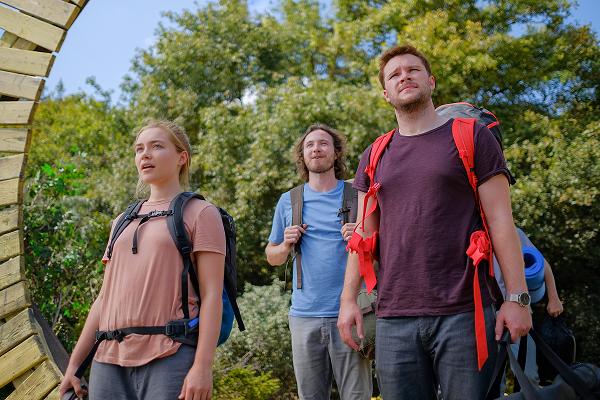
Those friends are Mark (Will Poulter), a crass layabout that’s the source of a surprising amount of comedy, Josh (William Jackson Harper), a Ph.D. student that’s basically the Anthropology department version of Harper’s Good Place character Chidi, and Pelle (Vilhelm Blomgren), the jovial and kind Swedish exchange student whose ancestral matriarchal village they’ll be visiting. What we see of the men’s relationships to one another is defined by the kind of casual chauvinism and Boys Club mentality that permeates so many male relationships, and unfortunately, the world of academia. Over the course of the film, we’ll come to realize that these men aren’t even really friends, they’re just banded together out of convenience, shared interests, and a shared propensity for casual drug use.
Standing in sharp contrast to the awkward, pitying behavior of Christian, Mark, and Josh is Pelle. His warmth registers from frame one, with Blomgren perfectly conveying the softhearted, empathetic energy that his village will share. When Christian awkwardly attempts to express his emotions, it falls flat. Even if he cares for Dani, as he must have once, he’s not emotionally equipped to express it in a way that means a damn thing. Pelle, and his people, the warm and welcoming Hårga, offer a different kind of understanding than what her cold, perfunctory American support system can offer.
When the quartet arrives in Sweden it’s as though they’ve landed on another planet. Lush green hills, smiling faces, and a pastoral village that’s stood hidden and locked in time for generations. They quickly make friends, including a young couple visiting from London, and Pelle’s brother Ingmar who helpfully offers them hallucinatory psilocybin mushrooms, and they embark on what’s probably the most accurate depiction of magic mushrooms in cinematic history.
The soft glow of the mushrooms and the at turns soothing and disconcerting undulating of the world around them becomes a hallmark of the film’s visual style. The visual style is, in a word, idyllic. Through the lens of Pawel Pogorzelski’s camera, the village of Hälsingland is a dream world, a calm, soothing place, depicted with bright, welcoming colors, drenched in perpetual sunlight. The village is breathtaking, and because of how dissimilar the village is from our expectations for the genre, deeply disconcerting. The camera movements are controlled. The composition is precise and ever-so-slightly asymmetrical. Impressive invisible edits are hidden behind wipes and trick camera movements. And because of this controlled movement, even at 140 minutes, the film doesn’t feel long. It always feels like it’s hurtling towards something terrible.
All of these elements combine and contribute to that eerie feeling of inevitability. The effect is not unlike how the mushrooms and pastoral calm of the village work to break down the characters’ inhibitions, opening them up to the experiences around them.
And then, as they must, a variety of shoes begin dropping. The Hårga, of course, are a cult of ancient pagans who engage in a variety of arcane rituals, some of which culminate in death.
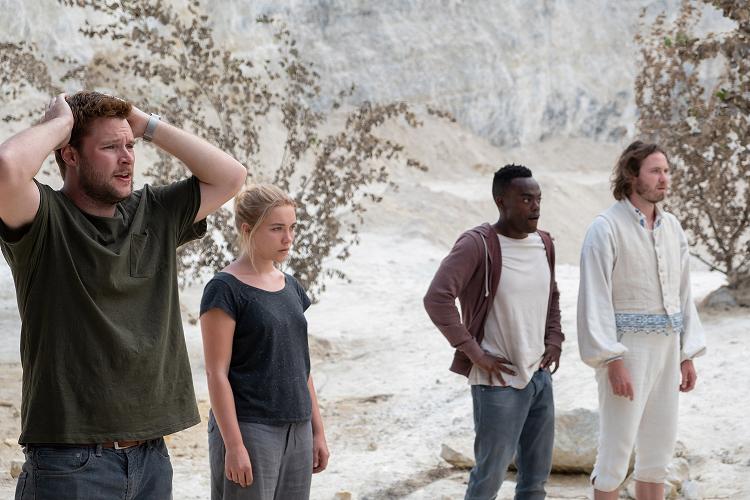
These deaths, which our protagonists witness, rattle them. Dani reacts most aggressively. Immediately ready to leave, she ignores her better judgment and stays, routinely beating back the little voice in the back of her head, the one that keeps Final Girls alive and defiantly grinning in the faces of masked killers everywhere. The Hårga continue to ply the group with hallucinogens and invite them to witness and participate in their rituals. Some are beautiful.
The group is quickly indoctrinated or at least enamored with the Hårga, and when horrifying truths are revealed and even more shoes drop, as the audience knows they must, the reactions are not what we’re used to. Politeness, social custom, and a general fear of being rude leads first to humoring the increasingly bizarre customs of the Hårga, and then acceptance of these customs’ necessity and inevitability. Even when these customs involve violence. Each red flag is immediately normalized, and tensions pacified. As their group identification grows, Dani becomes more and more willing to accept, and eventually participate, in these alien rituals. Even knowing that violence is always on the table.
The symbolic importance of that violence and what acceptance of it means for the characters are more important to Aster and company than the actual horror movie fun of the violence itself. The symbolic meaning of the deaths, and the cultural values they signal, is given a certain grandeur and grace that is starkly contrasted with the quick, brutal blows that are often made to feel small. Shocking, certainly, as he repeatedly cuts to scenes of the traumatic aftermath of this violence, but small none the less. A number of these deaths occur offscreen, characters passively walking off to meet their fate, denying the audience the cathartic relief of tension that a violent outburst might provide.
Aster is a filmmaker concerned with what ritual means, and in particular, the abandonment of the self that partaking in these rituals entails. Aster’s rituals, here and in HEREDITARY, carry a specific weight to them. They’re violent, yes, but they’re also highly organized. Carefully orchestrated regressions into a primal state. People stripping bare, assimilating into something larger than themselves, and letting go of their own autonomy in service of something ancient and preordained. They’ve let go and succumbed to the will of the group.
Individual responsibility ceases to matter inside the warm embrace of the collective. The rituals must be performed, and you needn’t concern yourself with their morality. After all, morality is decided in large part by the culture you exist inside of, something that a group of anthropology and folklore students like our ensemble would be quick to tell you. Whether these rituals have an actual mystical effect isn’t important at the end of the day, what’s important is the belief in the necessity of their performance and the connection it forges between participants.
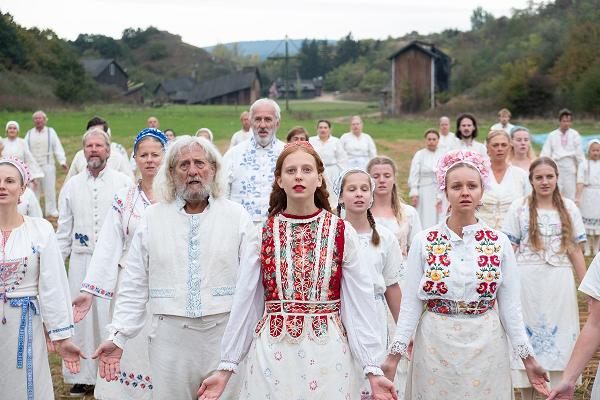
The Hårga’s culture provides them with comfort and stability, and no cost is too great to maintain that. The rituals have always been performed, and they will continue to be performed, precisely because they have always been performed. Dani’s suspicions and distrust of the Hårga slip away as she gradually begins to identify more with the Hårga than with the group of tourists she traveled with. As Dani folds herself into the Hårga, they provide her important things that her old life has been unable to. A sense of acceptance. Understanding. A family. “Do you feel held by him?”, Pelle questions.
The Hårga also benevolently strip her of what she wants to lose but that she hasn’t been able to shed herself. Her past. Her trauma. Her toxic relationship. Human lives are shaped by the things that happen to us and even more so by how we choose to react to those things thrust upon us. Choices can be made for us, and as Dani learns, whether we’d like to admit it, there’s a certain comfort in having the need to choose taken away. Dani wants a fresh start, and she finds it, but the village’s blessing, like the approval of any group, comes with a cost. To benefit from the safety and security of the group, sacrifices both figurative and literal must be made. Dani’s choices feel like self-realization, but they’re not. Dani’s choices are the result of giving in to the will of the collective.
Your autonomy can easily be ceded to an outside force, and if the reward is enticing enough, you may not even miss it.
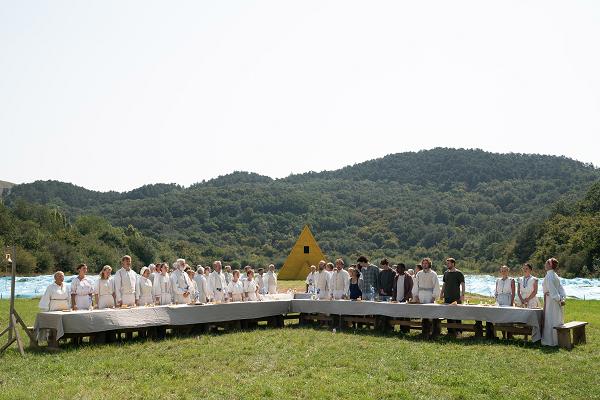
How much of the Hårga’s acceptance and love is genuine, and how much of it is performative repetition designed to help them accomplish their occult goals is left up to the viewer to decide. My personal interpretation is the bleaker of the choices.
Aster’s second film swings for the fences in terms of social commentary. The targets of his critiques are the power structures and relationships that define us, be they organized religion, our community, our friendships, our romantic relationships. Aster interrogates all of these bonds and finds them lacking. Some of them are made to seem downright comical. The source of the sacred Hårga texts paints a certain picture of Aster’s views on organized religion. One wonders if Aster views all relationships this nihilistically. The film certainly seems to.
The plot is not an exceptionally novel one. The surprises are few and far between. The sense of inevitability of all of this is established before you sit down. There are arguably no scares.
Instead, what MIDSOMMAR excels at is building and sustaining a sense of dread and discomfort, and most critically, examining the mundane, selfish horrors we inflict on each other.
Like the ritual violence the village engages in, our lives are the result of beliefs and behaviors that we rarely have cause to interrogate. They simply are. You simply are. How many of your beliefs and actions are in your life because of a conscious decision and how many of them are there through passive acceptance? How much evil, and how much suffering, does your worldview require you to ignore? How much evil does your worldview require you participate in?
The world of the Hårga is one of smiling fascism, of consensually entered into bondage. Every relationship is performative. Every relationship seems to be one of ritual, of routine, of history. No one is truly what they seem. But despite all of this, if you’re made to feel comfortable and accepted, even if you know it’s false, you might be surprised at what you’re capable of doing to preserve that feeling. That seems like a very timely message, doesn’t it?
Despite the colorful wrapping, MIDSOMMAR is as bleak as they come and is a film that will both divide and horrify. It’s inevitable.
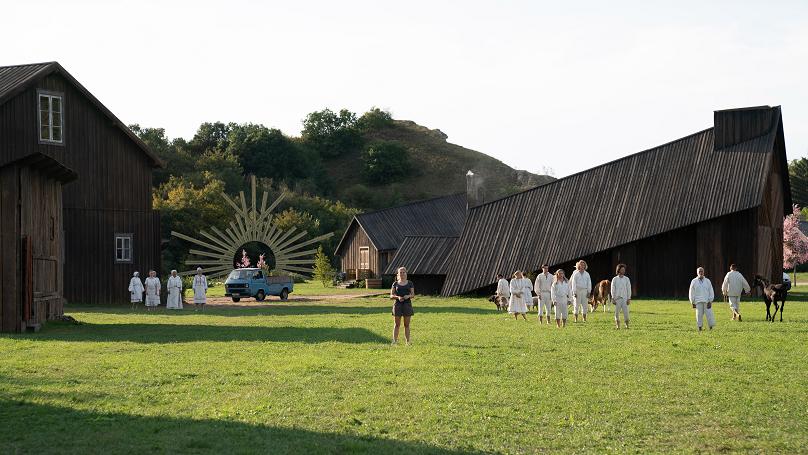
Tags: A24, Archie Madekwe, Ari Aster, Ellora Torchia, Florence Pugh, Horror, Jack Reynor, Lucian Johnston, Pawel Pogorzelski, Sweden, The Haxan Cloak, Vilhelm Blomgren, Will Poulter, William Jackson Harper

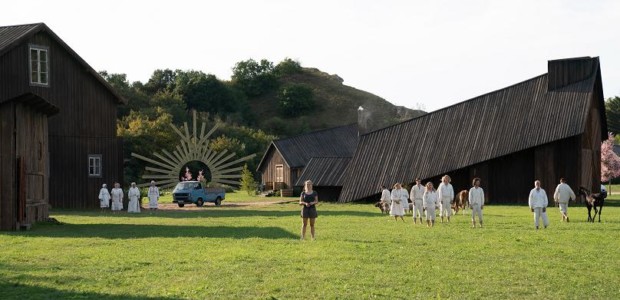
No Comments